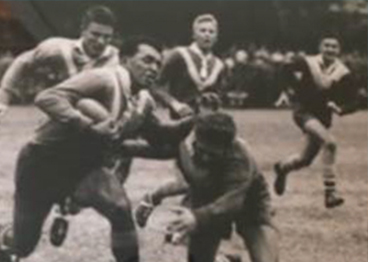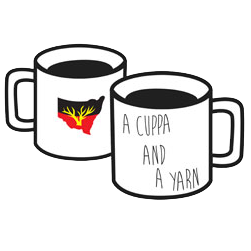
6 March, 2020
Ahead of the Ella 7’s rugby tournament, NSWALC reflects on the extraordinary life of its founder, former Wallaby, Mullenjaiwakka Lloyd McDermott:
How much would you be prepared to sacrifice for your principles? Would you give up the chance to wear the green and gold? Would you say no to a prestigious award?
Mullenjaiwakka Lloyd McDermott did both of those things.
Born in Eidsvold, Central Queensland, Mullenjaiwakka didn’t start formal education until the age of 12, because Aboriginal kids weren’t welcome at the local schools. Instead, his mum Violet home-schooled him while they lived in the bush working.
Once his parents realised he was a gifted student and athlete they saved every cent they could and then some. With the rest of the family pitching in they had enough for one year of tuition at one of the best schools in Brisbane, the Church of England Grammar school, also known as Churchie.
After that first year, young Lloyd secured a sporting and academic scholarship before studying, first dentistry and then law at the University of Queensland, while also playing rugby for the QLD Reds. By the end of 1962 he had played two tests on the wing for the Wallabies against the All Blacks. At the end of the season, he was picked to tour South Africa.
But there was a catch. Under that country’s apartheid regime, members of the Springboks had to be white, as did their opponents. So in order to play, Mullenjaiwakka had to agree to being classified as an “honorary white”. That was something that he as a proud Muninjali and Wakka Wakka man could never do.
Mullenjaiwakka’s daughter, Phillipa said it was an easy decision to make, given her father’s obligations to his family who had given him the opportunity to attend school and play rugby.
“He never wanted to let our family down. He was very honoured that they did that for him. He knew that he couldn’t have done that without them,” she said.
He was also indebted to his people who had supported him.
“His pride in being Aboriginal was that he didn’t want to let his people down because they all supported him when he was playing rugby for the Reds, through uni, through school. He would never deny his Aboriginality because so many people had counted on him and he wanted them to be proud.”
He withdrew from the team and never played rugby for Australia again.
Instead, he switched codes and briefly turned out for Wynnum Manly in the Brisbane Rugby League competition on the opposite wing from Australia’s first Aboriginal Kangaroo representative, Lionel Morgan.
“He lost his rugby career, but he didn’t let that hold him back,” Phillipa said.
“He was one for taking up opportunities. If one door closes another one opens. Don’t get bogged down by what could have been. Because we were denied so many opportunities as Aboriginal people, he was all about ‘take any opportunity you can get and give it a go.'”
His foray into league was short-lived because Mullenjaiwakka had his sights set on the courtroom. He became Australia’s first Aboriginal barrister and served for many years at the NSW Bar. Out of respect for his achievements, some of his colleagues nominated Mullenjaiwakka for an Order of Australia medal. But when he received the phone call informing him of the award, he politely declined. “No white man’s award for me,” he said.
Tony McAvoy, Australia’s first Aboriginal Senior Counsel said these actions were typical of his former mentor and colleague.
“Lloyd had a level of personal integrity that often these days can be difficult to find,” Tony said.
“He couldn’t live with himself having those conflicting, contradictory actions.”
Mullenjaiwakka’s excellence in sport and the law were just segments of his multi-faceted life.
As well as speaking three languages and graduating with degrees in criminology and science as well as law, he was a jazz guitarist and presented the Jazz Hour on Koori Radio for many years.
“His love of jazz was in part the mixture of a curious mind and a belief that he could pursue and do whatever he wanted to and not be limited by what others thought of him,” Tony said.
McAvoy was one of the many young Aboriginal lawyers who benefited from Mullenjaiwakka’s knowledge and generosity.
“From the very outset he was one of my mentors as well as being a very good friend. He and Bob Bellear, while he was alive, were both people who I could call on about any issue.”
“There’s a difficulty when you’re first at the Bar as a young Aboriginal person. As a young barrister I felt reluctant to ask people questions for fear that they might think I didn’t know enough to be at the Bar. But I never felt embarrassed or unwelcome with him or that my questions were not taken seriously, and I was always given the benefit of Lloyd’s knowledge.”
The desire to support young Aboriginal people was what led Mullenjaiwakka to join with fellow former Wallaby, Gary Ella to establish the Lloyd McDermott Rugby Development team.
Gary said that in their first conversation, Mullenjaiwakka asked why the game hadn’t produced more Aboriginal Wallabies.
“And the conversation went, ‘well if you could get all your legal mates together and chuck a few dollars in, we’ll start running separate camps.'”
He received a call from Mullenjaiwakka two weeks later.
“Well, I’ve got the money. When are we going to run it?”
Right from the beginning, the focus of the Development team was broader than only rugby.
“One of the things that Lloyd always pushed with us was that it wasn’t about football. It wasn’t about rugby. It wasn’t about sport. It was about giving young Aboriginal people the opportunity to make good choices in life and how we could support it,” Ella said.
“That’s what Lloyd was good at. Building people’s character.”
McAvoy said Mullenjaiwakka’s life also offers lessons for people involved in the Land Rights movement.
“This is really a lesson about life generally,” he said.
“Do not permit yourself to be limited by others’ expectations. We all have the capacity to do great things. Like Lloyd, we just have to want to do it.”
Mullenjaiwakka Lloyd McDermott died in April 2019, but his work continues.
You can support the Lloyd McDermott Rugby Development team at https://www.revolutionise.com.au/lloydies/or go along to the Annual Fundraising dinner on 8 April, 2020. Contact Rod Willey on rod.willey@rugby.com.au.

